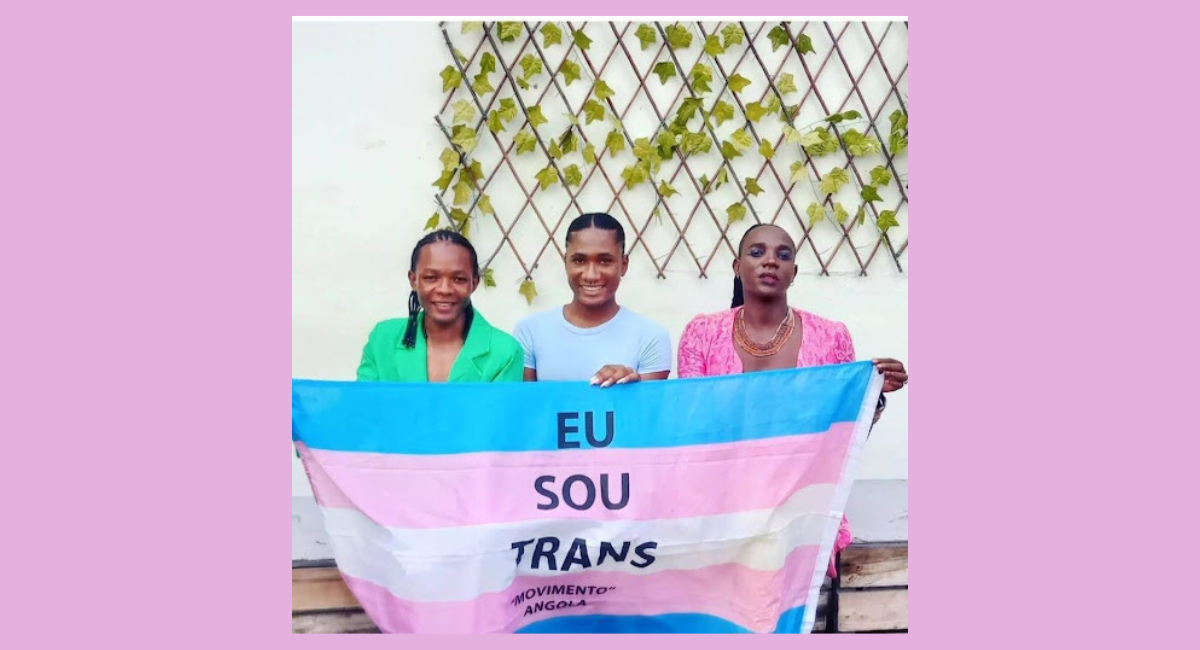Banner image of trans rights organisation Movimento Eu Sou Trans Angola’s Facebook page.
Local activists Movimento Eu Sou Trans Angola and Íris Angola Association say anti-LGBTQ campaigners are preparing to “exclude and erase” LGBTQ people.
by Beza Lealem
A campaign seeking to erase LGBTQ content and references from television and the internet, is gathering pace in Angola, led by a shadowy group calling themselves “civic and religious activists,” revealed Relíquia Ryan, director of administration and finance at Íris Angola Association, in a June interview with MambaOnline.
“They are anonymous, [but] we are investigating who they are and taking the appropriate action,” Ryan explained. “This is a clear attempt to roll back the legal progress we have made [in Angola], especially after decriminalising same-sex relationships…Legally, it directly conflicts with the constitution, which guarantees equality, dignity, and freedom of expression.”
In February 2021, Angola’s President Joao Lourenco signed into law an amended penal code allowing same-sex relationships and banning discrimination on the basis of sexual orientation.
According to Imanni Da Silva, founder of trans rights organisation Movimento Eu Sou Trans Angola, a ban on LGBTQ content would only worsen conditions for trans people who are already persecuted in the country. “It’s an attempt to convince the public that we are a problem. That gives power to those looking for an excuse to exclude and erase us,” Da Silva told MambaOnline, noting a rise in the number of cases of discrimination by police agents, teachers, and healthcare workers.
Movimento Eu Sou Trans Angola shared an open letter on the organisation’s Facebook page from transgender Angolan singer Titica in late June which highlighted the growing hostility.
“In recent days, I have been the target of attacks, boycotted and defamation on the internet, with the publication of content that in no way represents who I am — as an artist, as a woman, as a human being,” read Titica’s letter.
“These acts are not only an attempt to tarnish my public image, but also a reflection of the structural transphobia that so many trans women face on a daily basis. It is a kind of violence that attempts to silence our existence, question our value, and erase our dignity. But I won’t shut up. My voice has always been an instrument of struggle, of culture, and of transformation—and it will always be. I am Titica. I am a woman. I am trans. And I demand respect,” the letter continued.
Despite the anti-LGBTQ laws that were still on the books at the time, Titica overcame the odds, gaining popularity in the early 2010s as a star of kuduro, an Angolan music genre and dance of the same name. In a 2012 interview with the BBC, the artist revealed some of the violence she faced along the way. “I’ve been stoned, I’ve been beaten, and there is a lot of prejudice against me,” she said.
A ban on LGBTQ content in Angola would amount to a ban on LGBTQ people, accelerating a reversal of the progress the country has made in recent years, suggests Rosie Motene, co-chair of southern Africa LGBTQ rights advocacy The Other Foundation.
“Any form of erasure or ban on our existence creates dangerous conditions, it legitimises hate, emboldens the far right, and gives homophobia and transphobia a legal and cultural foothold. Culturally, it sends a message that queer and trans people do not belong, that their experiences are shameful or criminal,” Motene explained.
Motene joined other activists in calling for regional collaboration to combat the rising tide of anti-LGBTQ campaigns but cautioned against what she described as “performative solidarity.”
“One key lesson is the urgent need for true pan-African solidarity that is inclusive of Lusophone, Francophone, and other often-marginalised regions… who are often sidelined in regional discourse… That means understanding the specific context in Angola, the language, the legal framework, and [our] unique challenges,” Motene said.
“Visibility without protection is not enough. We must build infrastructure that protects our communities legally, culturally, and physically.”

